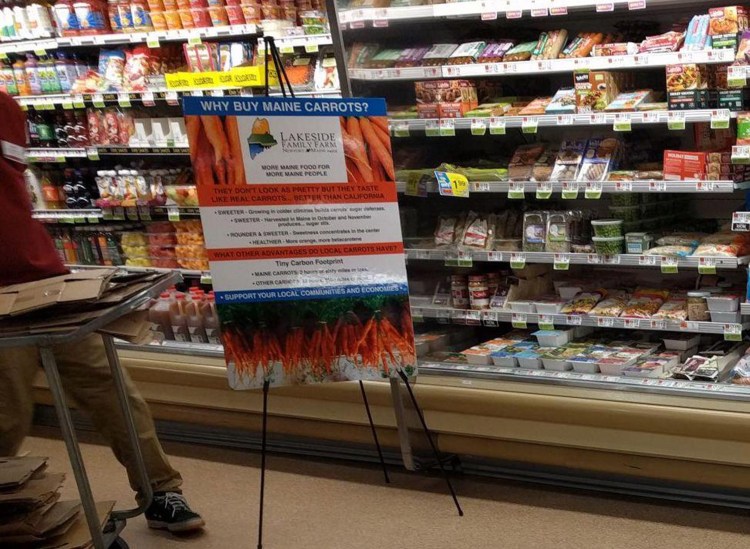Farmer Stewart Smith recently bought 500 pounds of California carrots, even though he has a warehouse full of perfectly good – and he thinks definitely better – carrots he grew at Lakeside Family Farm in Newport. And he’s giving the California carrots away.
It’s a test. For shoppers and for Lakeside’s product. Every 3-pound bag of Lakeside carrots sold in select Hannafords around the state – and also handed out at the Maine Agricultural Trades Show Tuesday through Thursday in Augusta – will contain some extra weight in the form of two of those California carrots. It’s not a blind test; the California carrots will be held together with a rubber band and the package is labeled to let consumers know they’re getting a something extra in the bag.
Smith and his wife, Sarah Redfield, are banking on their carrots, though maybe not as pretty as the California product, tasting so much sweeter and fresher – the latest harvest came out of the sugar-producing cold Maine ground in late November – that the consumer will be moved to demand their local grocery store to stock Maine produce whenever possible. And to send feedback to Lakeside via its website or Facebook page.
If they taste the same, the farmers at Lakeside think they’re still making a point about carbon footprints, buying local and keeping family farms in business. This year, sales to local supermarkets haven’t been as good, and they think that’s wrong.
“Even if Maine carrots tasted just like California carrots,” Redfield said. “Maine consumers should still be going to their store to say, ‘We want Maine carrots, beets, potatoes,’ all the crops that Maine farmers have in storage right now. Because if we don’t buy these things, they’re going to end up as pig food.”
Smith, an economist and former Maine Commissioner of Agriculture, is a nationally recognized proponent of agriculture in the middle, the mid-sized family farms that are so threatened in today’s marketplace. They’re big enough to sell wholesale versus at farmers markets, but they don’t produce enough to always reliably fill the warehouses of chains like Hannaford the way bigger farms can.
The idea for a consumer taste test came about when Lakeside was considering new packaging for its 2-pound bags of carrots last year. They went to their local Hannaford and bought every brand there was so they could examine the packaging. “Then we had all these stupid carrots, and it’s not like we didn’t have our own carrots,” Redfield. So they started putting the carrots out on a plate side-by-side with Maine carrots in a blind test.
“And the Maine carrots never lost,” Redfield said.
What started out as a joke then turned into this year’s clever marketing gimmick, prompted in fact by a 35 percent drop in the farm’s carrot sales to supermarkets this season. Lakeside carrots are being sold in Hannaford stores in Brewer, Kennebunk and Westbrook, as well as two locations in Bangor (the Broadway and Airport stores) but on the whole, Redfield said, Hannaford has bought fewer carrots from them.
Hannaford spokesman Eric Blom said there was not an easy way to track whether there was a decline in the chain’s overall purchasing of Maine carrots and if so, why that would have happened. But Hannaford isn’t cutting back on local produce, he said in an email: “For example, we sold 200,000 cases of Maine broccoli and cauliflower during the 2016 growing season, an increase of 16.5 percent over the previous year.”
Hannaford carries mre than 6,000 branded products from Maine, New Hampshire, Vermont, Massachusetts and New York. Some products that appear as Hannaford or Taste of Inspiration private bands also are grown and produced locally, Blom said.
Redfield wasn’t trying to criticize Hannaford specifically. Nor does she care only about carrots.
“I say the same thing about potatoes,” Redfield said. “There is no reason I have to go to Whole Foods in Maine and see Montana potatoes. I don’t want to see that. I agree that it’s easiest for these stores to get these things out of their warehouse instead of locally, but we Maine consumers should be saying, ‘These taste better. And they have a carbon footprint of about an hour.’ “
Send questions/comments to the editors.



